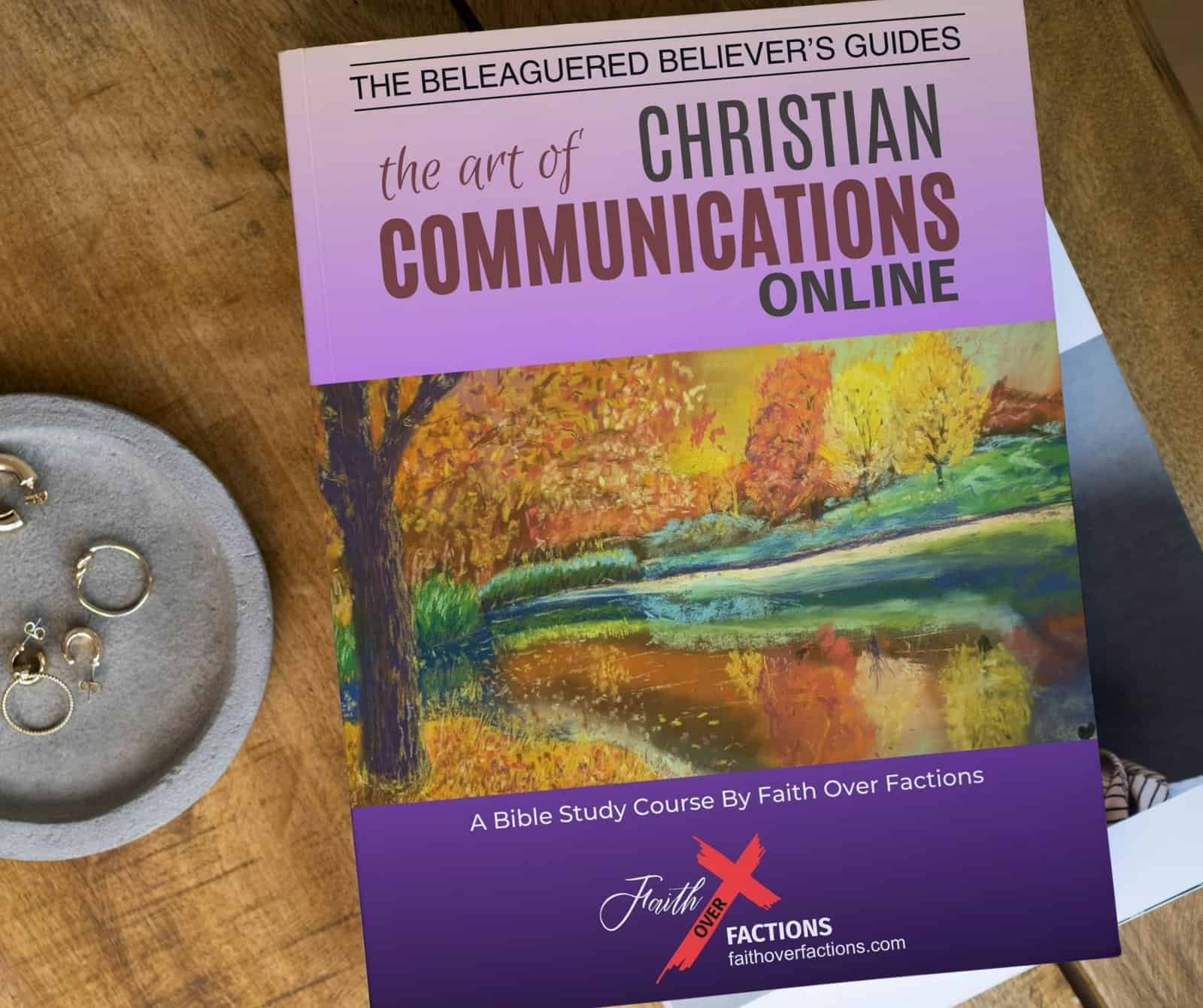
When Subtle Shifts Lead Us Away from the Doctrine of Christ
Christian Nationalism does not always advance itself in loud or obvious ways. Many assemblies never set out to preach Christian nationalist dogma. The drift sometimes comes quietly, one phrase at a time, one anxious prayer at a time, and no one notices the danger until it is late. Good-hearted people who love Jesus can find themselves caught in an assembly that has begun centering faith on political or cultural identity instead of redemption’s cross.
This reflection is not about finger-pointing or casting blame, nor is it about making decent people feel bad about choices made in concert with their church family. It is about love and awareness. It is about offering words and context for what many sense but cannot quite name. It is about reaching out to those who feel uneasy but do not want to abandon their faith or their home assembly. Together we can look with honesty at the subtle signs that shift a church from Christ to what others have defined and identified as Christianity.
Anchor in the Word
Key Verse
“Seek the Kingdom of God above all else, and live righteously, and he will give you everything you need.”
Matthew 6:33 (NLT)“But first and most importantly seek (aim at, strive after) His kingdom and His righteousness [His way of doing and being right—the attitude and character of God], and all these things will be given to you also.”
Matthew 6:33 (Amplified Bible)Key Scripture Context
These words come from Jesus’ Sermon on the Mount, a hillside moment where ordinary people sat under the open sky and heard Him speak about a way of life that defied fear and striving. He told them not to chase after food, clothing, or security as if those things were ultimate. Instead, He invited them to trust a Father who already knew their needs.
For us today, this verse calls us back from the anxious pull of control. It confronts the voice of nationalism that says we must preserve influence at any cost. Jesus’ words remind us that the Kingdom is not about domination but about trust, not about securing our place, but about surrendering to His. The promise is simple: when God’s Kingdom is first, the rest falls into place under His care. When we get anxious because of stories told to us, or that we tell ourselves, we can miss the essentials of His calling.
What We’re Facing
We live in a time when Christian nationalist extremism is shouting rage with harsh and un-Christlike voices, when religious jargon and faux righteousness are used to whitewash dominance, bigotry, hatred, divisiveness, the marginalization of the vulnerable, and political idolatry. Wealth and power are positioned as the blessings of God through a false prosperity gospel, all to songs that may stir emotion but do little to lift high the cross. How did we get to this place?
When nationalism creeps into the church, it often does so in subtle ways rather than as a flood. Quietly, insidiously, it shapes how we pray, how we talk about power, and how we imagine our place in the future. It baptizes fear in religious language until we believe we are defending the Gospel when in truth we are defending our own influence and ego.
It feels spiritual.
It feels “righteous.”
It draws us into protecting status instead of lifting the cross.
Then and Now — Drawing Parallels
Israel often confused God’s blessing with national strength. Prophets like Jeremiah and Amos warned against trusting kings, armies, or nostalgic memories. The early church too faced pressure to align itself with Rome for safety. The temptation today is no different. Churches shift from proclaiming the Gospel to:
Praying for military victories in conflicts around the globe, asking God to bless a national ally while ignoring the welfare of innocents damaged or destroyed by the madness of war.
Infusing sermons with cultural or political suggestions, subtle nudges that sound spiritual but steer hearts toward ideology instead of Jesus.
Emphasizing certain sins while ignoring corruption in high places, focusing judgment downward while leaving the powerful unchallenged.
We must recognize these parallels before the drift begins to feel like the new normal.
Theological Truth in Plain Language
The Gospel does not depend on political power. The Kingdom of God has thrived in exile, in poverty, and under persecution. In fact, seasons of trial have often been the church’s greatest moments of triumph. What it cannot survive is idolatry. When the church bows to the nation instead of to Christ, it forfeits its witness. Bonhoeffer reminded us, “The church is the church only when it exists for others” (Dietrich Bonhoeffer, Letters and Papers from Prison, 1944). The Gospel calls us outward in love, while nationalist ideology turns us inward toward self-preservation. The church shifts from being a movement on the march to a fortress under siege. This is never the will of Christ for the church.
10 Subtle Ways Christian Nationalist Ideology Creeps Into the Body of Believers
Christian nationalism rarely announces itself with bold claims. More often, it slips in quietly, shaping the atmosphere of a church before anyone notices. It begins to color how we pray, how we speak about influence, and how we imagine our place in the world. These shifts are not always loud or obvious, and that is what makes them dangerous. They creep in slowly, disguised as faithfulness, until good and sincere people are carried along without realizing that something vital has changed. The cross moves to the background, while fear and control take the spotlight.
Into that moment Jesus still speaks: “Seek the Kingdom of God above all else, and live righteously, and he will give you everything you need” (Matthew 6:33, NLT). His words call us back from distraction, back from the lure of security, and back from the idol of control. They invite us to place our confidence not in the preservation of influence, but in the care of a Father who already knows our needs.
With that anchor, we can begin to see more clearly. Let us look carefully at ten subtle ways this drift happens in the church today, and how each one can be met with a faithful response that restores our gaze to Christ.
1. The Language of Control
Control-talk shows up in prayers, sermons, and conversations that say things like, “If only we had more power in the schools, more influence in the media, more control over laws. If only our candidate were in office to protect our rights.” The longing may sound righteous, but it reveals misplaced trust. The Spirit does not lead through dominance but through presence. And when the church seeks control first, it risks losing the very heart of its true power. “Not by force nor by strength, but by my Spirit, says the Lord of Heaven’s Armies” (Zechariah 4:6, NLT).
Remedy: When you hear control language being used, speak up, pause, and ask, “How would this sound if spoken with trust in God’s Spirit instead of fear of losing ground?” Redirect the conversation to God’s faithfulness rather than human power.
2. Fear of Losing Influence
Nationalist assemblies often carry an anxious tone, speaking repeatedly about decline. There is constant talk of losing cultural norms, losing rights, and losing a place in society. Fear of moral collapse among the unchurched is raised like a warning bell. Parents and leaders voice fear of losing the next generation to “the world.” Over time, this fear of loss becomes the guiding mood. Yet fear is not from God. The Kingdom we receive is not fragile, but unshakable. “Since we are receiving a Kingdom that cannot be shaken, let us be thankful and please God by worshiping him with holy fear and awe” (Hebrews 12:28, NLT).
Remedy: Name the fear out loud in prayer. Instead of clinging to influence, thank God for a Kingdom that endures beyond culture. Gratitude disarms fear and clears our vision to see that the greater threat to the church is not cultural irrelevance, but spiritual emptiness.
3. We and They Framing
Christian Nationalism thrives on division. Subtle phrases start to divide the world into “real Christians” and “outsiders,” “true Americans” and “everyone else.” This framing strips away the Gospel’s work of reconciliation. Scripture says, “God has given us this task of reconciling people to him” (2 Corinthians 5:18, NLT). When our language reduces people to enemies, we have lost the call to love our neighbors.
Remedy: Practice rephrasing. When someone speaks of “them,” add a word of love: “those neighbors we are called to serve.” Language defines intentions, shapes hearts, and influences actions.
4. National Destiny Prophecies
Sometimes Christian nationalism enters through casual talk like, “God raised this nation for a special purpose,” or, “Our country is chosen.” These claims make America the main character of the story instead of Christ. But Jesus said, “And when I am lifted up from the earth, I will draw everyone to myself” (John 12:32, NLT). The Gospel gathers the nations into Christ, not the other way around.
Remedy: When you hear a destiny claim, gently shift the focus: “What if we remembered that God’s ultimate purpose is to gather all nations into Christ?” Redirect the story to Jesus, not to country.
5. Power Words Replacing Kingdom Words
Language matters. When churches begin speaking more about winning, conquering, taking back, and victory than about repentance, service, sacrifice, and grace, the cross is pushed aside for the rhetoric of empire. The language of domination may stir passion, but it does not reflect the way of Jesus. Paul reminds us, “That is why I take pleasure in my weaknesses, and in the insults, hardships, persecutions, and troubles that I suffer for Christ. For when I am weak, then I am strong” (2 Corinthians 12:10, NLT). In the Kingdom, true strength is revealed not in conquest, but in surrender.
Remedy: Pay close attention to the vocabulary that shapes your community. Ask, “Are we speaking the language of empire, or the language of the Kingdom?” Restore words that reflect humility, mercy, and grace. Let Kingdom language — words of service, forgiveness, generosity, and hope — set the tone for what faith sounds like.
6. Selective Nostalgia
Many nationalist assemblies point to a golden age myth, telling stories of America’s past and longing to return to a dream often pictured in the 1950s. The problem is that this vision leaves out the injustices, the racism, and the exploitation that marked that same era. Nostalgia builds a false memory; it hides wounds and avoids repentance. Christ does not call us back to an imagined past, one that most of us never experienced, but forward into the now of His Kingdom.
Remedy: When nostalgia surfaces, bring up the voices that were silenced in that so-called golden age; ask what repentance and reconciliation look like in our time. Move the conversation away from longing backward and toward walking faithfully today with Christ.
7. Shrinking the Gospel to Culture Wars
In many nationalist assemblies, the Gospel is reduced to a handful of political rallying points. Sermons and conversations circle around hot-button issues, while the deeper truths of salvation, holiness, and resurrection fade into the background. When the good news of Jesus Christ is narrowed to cultural battles, it ceases to be the Gospel at all. Paul reminded the Corinthians of what mattered most: “I passed on to you what was most important and what had also been passed on to me. Christ died for our sins, just as the Scriptures said. He was buried, and he was raised from the dead on the third day, just as the Scriptures said” (1 Corinthians 15:3-4, NLT). The heart of our faith is not a platform, but a cross and an empty tomb.
Remedy: When culture-war rhetoric takes center stage, return to the essentials. Ask, “Where is the cross in this message? Where is the resurrection?” Pray for God to keep your heart anchored in Christ’s death and rising, not in the noise of political battles.
8. Equating Disagreement with Persecution
Christian nationalism often labels any criticism as “persecution.” When media voices push back, or neighbors disagree, it is sometimes framed as proof of faithfulness. Yet Scripture shows us that true persecution is far costlier; it looks like imprisonment, loss of property, or open suffering for the sake of Christ. “You suffered along with those who were thrown into jail, and when all you owned was taken from you, you accepted it with joy. You knew there were better things waiting for you that will last forever” (Hebrews 10:34, NLT). Throughout history believers have faced torture, exile, and even death for refusing to deny Christ. Around the world today many still worship in secret, knowing discovery could mean prison or worse.
When we call mere disagreement or criticism “persecution,” we cheapen the witness of those who truly suffer. Worse still, it can make the Gospel appear small and self-protective to those outside the church, reducing faith to wounded pride rather than courageous love.
Remedy: Learn to distinguish between genuine suffering for Christ and the loss of cultural comfort. Ask honestly, “Is this the cost of discipleship, or is it simply resistance to giving up privilege and influence?” Gratitude for the true freedom we already have in Christ reshapes our perspective and keeps our witness credible.
9. Silencing Doubt or Nuance
In nationalist assemblies, questions are often treated as weakness or even betrayal. Complexity is brushed aside as if it were compromise, and nuance is silenced in favor of rigid certainty. Yet Scripture calls us to a different posture: “But test everything that is said. Hold on to what is good” (1 Thessalonians 5:21, NLT). True faith is not afraid of questions; it grows stronger through discernment, not through suppression. A faith that cannot withstand honest doubt is already fragile and brittle.
Remedy: Make space for curiosity. Thank those who ask hard questions, and model the courage to ask your own. Questions, when carried with humility, deepen faith and open the door to greater trust in Christ.
10. The Subtle Centering of the Nation in Prayer
Listen closely to the prayers of a church. Are they mostly about national greatness, national preservation, and national victory? Do they position a particular leader as if he were God’s chosen one, divinely appointed to rescue the nation? When this happens, prayer shifts from seeking God’s will to blessing human ambition. Christ taught us to pray differently: “May your Kingdom come soon. May your will be done on earth, as it is in heaven” (Matthew 6:10, NLT). When prayers elevate the nation or exalt political figures, affection drifts away from Christ and slides into idolatry.
Remedy: Broaden the horizon of prayer. Lift up the poor, the foreigner, the outcast, and the global church that shares in Christ’s suffering. Widening the circle reflects God’s heart for all nations and guards us against mistaking political leaders for messiahs.
Practical Moves of Faith
Name the Drift
If you notice language of control or nostalgia, do not let it slip past you. Write it down; keep a journal record of the words and patterns you hear. Over time these small notes reveal larger trends. Clarity begins with naming what you see, and what once felt like a vague uneasiness becomes something you can bring honestly before God in prayer.
Recenter Prayer
Shift prayer away from earthly concerns like culture and politics, and turn it toward God’s Kingdom. Lift up the poor, the stranger, and the global church that bears witness to Christ across every nation.
Practice Reconciliation
Find ways to step across dividing lines. Pray for those you disagree with, and be willing to engage in conversation with the very people who are often spoken of as “they,” “them,” or “those people over there.” Listen to their stories; hear their perspective. Reconciliation begins when we see one another as neighbors rather than categories. As Paul wrote of Christ, “For Christ himself has brought peace to us. He united Jews and Gentiles into one people when, in his own body on the cross, he broke down the wall of hostility that separated us” (Ephesians 2:14, NLT).
Choose Weakness Like Christ
Resist the pull to chase cultural victories or to measure success by influence and power. The way of Christ does not look like domination; it looks like a cross. Choosing weakness means embracing small, often unseen acts of service that reflect His self-giving love: visiting someone who is lonely, forgiving when it would be easier to hold a grudge, serving without needing recognition. This is not easy; it cuts against our instincts and against the values of the world. Yet Paul reminds us, “Though he was God, he did not think of equality with God as something to cling to. Instead, he gave up his divine privileges; he took the humble position of a slave and was born as a human being” (Philippians 2:6-7, NLT). To choose weakness like Christ is to trust that His way of surrender leads to true strength and lasting victory.
Ask Hard Questions
When sermons or conversations begin to slide toward politics, do not let the moment pass without discernment. Ask gently but clearly how the message aligns with the teaching of Christ. Questions open space for truth and can break the spell of unexamined assumptions. Yet asking hard questions is not without risk. It may bring misunderstanding, defensiveness, or even exclusion. Still, silence in the face of distortion is more costly. Scripture reminds us, “Instead, we will speak the truth in love, growing in every way more and more like Christ, who is the head of his body, the church” (Ephesians 4:15, NLT). Asking hard questions in love is an act of faithfulness, a willingness to stand with Christ even if it means standing apart.
More Light for the Journey
John 18:36 (NLT)
“My Kingdom is not an earthly kingdom.”
→ Reminds us that Jesus Himself separated His mission from political power.
Philippians 3:20 (NLT)
“We are citizens of heaven, where the Lord Jesus Christ lives.”
→ Calls us to root our identity in Christ above all earthly allegiances.
2 Timothy 1:7 (NLT)
“For God has not given us a spirit of fear and timidity, but of power, love, and self-discipline.”
→ Confirms that fear is not from God and cannot guide our faith.
Isaiah 56:7 (NLT)
“For my Temple will be called a house of prayer for all nations.”
→ Shows God’s heart for a global family, not a national project.
Let’s Walk This Out Together
Prayer Prompt:
“Lord, open my eyes to the quiet shifts that lead away from You. Give me courage not only to notice them, but to act faithfully when assemblies refuse to turn back. Help me to seek Your Kingdom above all else, even when it costs me comfort or belonging. Teach me to follow Your voice over every human authority.”
Nationalist idolatry rarely screams on the way in. It creeps, almost invisible, until the abnormal begins to feel normal and the drift feels permanent. But the Spirit has not stopped calling us back, back to Christ, back to the Kingdom that cannot be shaken. If you have noticed these signs in your assembly, take heart. You are not alone. Christ is still leading His people into truth and toward His way of love.
Yet here is the hard truth: not every assembly will choose to turn. Some will double down, refusing to check the drift, confusing loyalty to nation or leader with loyalty to Christ. And when that happens, you will face a choice. Our souls are not bound to human or institutional authority. Obedience to Christ is greater than obedience to a pastor, a movement, or a denomination. To stay in a place that refuses correction can slowly suffocate your faith. To step away can feel like loss, but it is also a form of freedom, freedom to follow Jesus without compromise.
I am not here to play games or soften words. The cost of discipleship has always been real. If a church refuses to lift high the cross, you do not owe it your silence or your allegiance. What you owe is your heart, your mind, and your life to the One who said, “My sheep listen to my voice; I know them, and they follow me” (John 10:27, NLT). Listen for His voice. Follow Him. Even if it means leaving behind the voices that no longer echo His.
Share your reflections in the comments or on social media with #KingdomFirst. Together, let us choose Christ over control.
Journaling Prompt — “Whispers or Warnings?”
Prayer Prompt:
“Lord, search my heart. Show me where I have trusted in control or fear instead of You. Give me wisdom to know when to speak, when to wait, and when to walk away. Teach me to trust Your Kingdom more than any human authority.”
Where have you noticed language of control, fear, or political devotion in your church or community? Write down the exact phrases or patterns that stood out.
How have those words made you feel — uneasy, silenced, pressured, or afraid? Be honest in naming the effect on your faith.
Are these whispers simply a passing concern, or are they warnings that something deeper is shifting?
How might God be leading you to respond — to pray, to ask hard questions, or to step away in obedience to Him?
What would it look like to reshape those moments in your own life into prayers of trust in God’s Kingdom rather than reliance on earthly influence?







